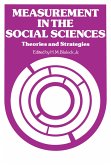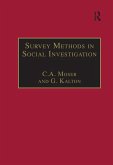The Art of Empirical Investigation (eBook, PDF)
Redaktion: Simon, Julian
46,95 €
46,95 €
inkl. MwSt.
Sofort per Download lieferbar

23 °P sammeln
46,95 €
Als Download kaufen

46,95 €
inkl. MwSt.
Sofort per Download lieferbar

23 °P sammeln
Jetzt verschenken
Alle Infos zum eBook verschenken
46,95 €
inkl. MwSt.
Sofort per Download lieferbar
Alle Infos zum eBook verschenken

23 °P sammeln
The Art of Empirical Investigation (eBook, PDF)
Redaktion: Simon, Julian
- Format: PDF
- Merkliste
- Auf die Merkliste
- Bewerten Bewerten
- Teilen
- Produkt teilen
- Produkterinnerung
- Produkterinnerung

Bitte loggen Sie sich zunächst in Ihr Kundenkonto ein oder registrieren Sie sich bei
bücher.de, um das eBook-Abo tolino select nutzen zu können.
Hier können Sie sich einloggen
Hier können Sie sich einloggen
Sie sind bereits eingeloggt. Klicken Sie auf 2. tolino select Abo, um fortzufahren.

Bitte loggen Sie sich zunächst in Ihr Kundenkonto ein oder registrieren Sie sich bei bücher.de, um das eBook-Abo tolino select nutzen zu können.
Julian Simon was known for his methodical, and often controversial, writings challenging conventional beliefs about overpopulation, pollution, disappearing farmland, and the scarcity of energy sources and raw materials
- Geräte: PC
- mit Kopierschutz
- eBook Hilfe
- Größe: 74.46MB
Andere Kunden interessierten sich auch für
![Survey Research in the United States (eBook, PDF) Survey Research in the United States (eBook, PDF)]() Jean M. ConverseSurvey Research in the United States (eBook, PDF)58,95 €
Jean M. ConverseSurvey Research in the United States (eBook, PDF)58,95 €![Measurement in the Social Sciences (eBook, PDF) Measurement in the Social Sciences (eBook, PDF)]() Hubert M. BlalockMeasurement in the Social Sciences (eBook, PDF)46,95 €
Hubert M. BlalockMeasurement in the Social Sciences (eBook, PDF)46,95 €![Survey Methods in Social Investigation (eBook, PDF) Survey Methods in Social Investigation (eBook, PDF)]() C. A. MoserSurvey Methods in Social Investigation (eBook, PDF)57,95 €
C. A. MoserSurvey Methods in Social Investigation (eBook, PDF)57,95 €![The Research Act (eBook, PDF) The Research Act (eBook, PDF)]() Norman K. DenzinThe Research Act (eBook, PDF)46,95 €
Norman K. DenzinThe Research Act (eBook, PDF)46,95 €![Imaginative Methodologies in the Social Sciences (eBook, PDF) Imaginative Methodologies in the Social Sciences (eBook, PDF)]() Michael Hviid JacobsenImaginative Methodologies in the Social Sciences (eBook, PDF)57,95 €
Michael Hviid JacobsenImaginative Methodologies in the Social Sciences (eBook, PDF)57,95 €![Qualitative Analysis in the Making (eBook, PDF) Qualitative Analysis in the Making (eBook, PDF)]() Qualitative Analysis in the Making (eBook, PDF)42,95 €
Qualitative Analysis in the Making (eBook, PDF)42,95 €![Weber and Durkheim (eBook, PDF) Weber and Durkheim (eBook, PDF)]() Henrik JensenWeber and Durkheim (eBook, PDF)43,95 €
Henrik JensenWeber and Durkheim (eBook, PDF)43,95 €-
-
-
Julian Simon was known for his methodical, and often controversial, writings challenging conventional beliefs about overpopulation, pollution, disappearing farmland, and the scarcity of energy sources and raw materials
Dieser Download kann aus rechtlichen Gründen nur mit Rechnungsadresse in A, B, BG, CY, CZ, D, DK, EW, E, FIN, F, GR, HR, H, IRL, I, LT, L, LR, M, NL, PL, P, R, S, SLO, SK ausgeliefert werden.
Produktdetails
- Produktdetails
- Verlag: Taylor & Francis eBooks
- Seitenzahl: 558
- Erscheinungstermin: 28. Juli 2017
- Englisch
- ISBN-13: 9781351305631
- Artikelnr.: 48959404
- Verlag: Taylor & Francis eBooks
- Seitenzahl: 558
- Erscheinungstermin: 28. Juli 2017
- Englisch
- ISBN-13: 9781351305631
- Artikelnr.: 48959404
- Herstellerkennzeichnung Die Herstellerinformationen sind derzeit nicht verfügbar.
Julian Simon
Basic Research Methods in Social Science
1: Introduction
I: Part One the Process of Social-Science Research
2: The Language of Research: Definitions and Validitg
3: Basic Concepts of Research
4: Types of Empirical Research
5: Theory, Model, Hypothesis, and Empirical Research
6: Choosing Appropriate Proxies for Theoretical Variables
II: Part Two Research Decisions and Procedures
7: The Steps in an Empirical Research Study
8: How to Assess the Potential Value of Research Projects
9: Sampling
10: Experiments: Pro, Con, and how to do them
11: Designing Experiments
12: Non-Experimental Designs Far Studying Relationships
13: Surveys: Pro, Can, and how to do them
14: Same Other Qualitative and Quantitative Techniques
15: Classifying, Measuring, and Scaling
16: Scaling Human Responses
17: Data Handling, Adjusting, and Summarizing
III: Part Three the Obstacles to Social-Science Knowledge and Wags to Overcome them
18: The Concept of Obstacles in the Search for Ernpical Knowledge
19: Obstacles Created by the Humanness of the Observer: Appendix on Interviewing
20: Complexities and Intractability of the Human Mind: Appendix an Questionnaire Construction
21: Obstacles to Obtaining Adequate Subject Matter
22: Obstacles to The Study of Changes Aver Time
23: Obstacles to the Search for Causal Relationships
24: The Master Obstacle: Cost
IV: Part Four Extracting the Meaning of Data
25: Analysis of Simple Data: Association and Regression
26: Searching for Relationships: Analysis of Complex Data
27: Inferential Statistics: Introduction
28: Probability and Hypothesis Testing by the Monte Carlo Method
29: Hypothesis Testing with Measured Data
30: Correlation and other Statistical Issues
31: How Big a Sample?
32: The Concept of Causality in Social Science, with Notes on Prediction, Law, Explanation, and Function
V: Part Five Epilogue
33: The Nature, Powers, and Limits of Social Science
1: Introduction
I: Part One the Process of Social-Science Research
2: The Language of Research: Definitions and Validitg
3: Basic Concepts of Research
4: Types of Empirical Research
5: Theory, Model, Hypothesis, and Empirical Research
6: Choosing Appropriate Proxies for Theoretical Variables
II: Part Two Research Decisions and Procedures
7: The Steps in an Empirical Research Study
8: How to Assess the Potential Value of Research Projects
9: Sampling
10: Experiments: Pro, Con, and how to do them
11: Designing Experiments
12: Non-Experimental Designs Far Studying Relationships
13: Surveys: Pro, Can, and how to do them
14: Same Other Qualitative and Quantitative Techniques
15: Classifying, Measuring, and Scaling
16: Scaling Human Responses
17: Data Handling, Adjusting, and Summarizing
III: Part Three the Obstacles to Social-Science Knowledge and Wags to Overcome them
18: The Concept of Obstacles in the Search for Ernpical Knowledge
19: Obstacles Created by the Humanness of the Observer: Appendix on Interviewing
20: Complexities and Intractability of the Human Mind: Appendix an Questionnaire Construction
21: Obstacles to Obtaining Adequate Subject Matter
22: Obstacles to The Study of Changes Aver Time
23: Obstacles to the Search for Causal Relationships
24: The Master Obstacle: Cost
IV: Part Four Extracting the Meaning of Data
25: Analysis of Simple Data: Association and Regression
26: Searching for Relationships: Analysis of Complex Data
27: Inferential Statistics: Introduction
28: Probability and Hypothesis Testing by the Monte Carlo Method
29: Hypothesis Testing with Measured Data
30: Correlation and other Statistical Issues
31: How Big a Sample?
32: The Concept of Causality in Social Science, with Notes on Prediction, Law, Explanation, and Function
V: Part Five Epilogue
33: The Nature, Powers, and Limits of Social Science
Basic Research Methods in Social Science
1: Introduction
I: Part One the Process of Social-Science Research
2: The Language of Research: Definitions and Validitg
3: Basic Concepts of Research
4: Types of Empirical Research
5: Theory, Model, Hypothesis, and Empirical Research
6: Choosing Appropriate Proxies for Theoretical Variables
II: Part Two Research Decisions and Procedures
7: The Steps in an Empirical Research Study
8: How to Assess the Potential Value of Research Projects
9: Sampling
10: Experiments: Pro, Con, and how to do them
11: Designing Experiments
12: Non-Experimental Designs Far Studying Relationships
13: Surveys: Pro, Can, and how to do them
14: Same Other Qualitative and Quantitative Techniques
15: Classifying, Measuring, and Scaling
16: Scaling Human Responses
17: Data Handling, Adjusting, and Summarizing
III: Part Three the Obstacles to Social-Science Knowledge and Wags to Overcome them
18: The Concept of Obstacles in the Search for Ernpical Knowledge
19: Obstacles Created by the Humanness of the Observer: Appendix on Interviewing
20: Complexities and Intractability of the Human Mind: Appendix an Questionnaire Construction
21: Obstacles to Obtaining Adequate Subject Matter
22: Obstacles to The Study of Changes Aver Time
23: Obstacles to the Search for Causal Relationships
24: The Master Obstacle: Cost
IV: Part Four Extracting the Meaning of Data
25: Analysis of Simple Data: Association and Regression
26: Searching for Relationships: Analysis of Complex Data
27: Inferential Statistics: Introduction
28: Probability and Hypothesis Testing by the Monte Carlo Method
29: Hypothesis Testing with Measured Data
30: Correlation and other Statistical Issues
31: How Big a Sample?
32: The Concept of Causality in Social Science, with Notes on Prediction, Law, Explanation, and Function
V: Part Five Epilogue
33: The Nature, Powers, and Limits of Social Science
1: Introduction
I: Part One the Process of Social-Science Research
2: The Language of Research: Definitions and Validitg
3: Basic Concepts of Research
4: Types of Empirical Research
5: Theory, Model, Hypothesis, and Empirical Research
6: Choosing Appropriate Proxies for Theoretical Variables
II: Part Two Research Decisions and Procedures
7: The Steps in an Empirical Research Study
8: How to Assess the Potential Value of Research Projects
9: Sampling
10: Experiments: Pro, Con, and how to do them
11: Designing Experiments
12: Non-Experimental Designs Far Studying Relationships
13: Surveys: Pro, Can, and how to do them
14: Same Other Qualitative and Quantitative Techniques
15: Classifying, Measuring, and Scaling
16: Scaling Human Responses
17: Data Handling, Adjusting, and Summarizing
III: Part Three the Obstacles to Social-Science Knowledge and Wags to Overcome them
18: The Concept of Obstacles in the Search for Ernpical Knowledge
19: Obstacles Created by the Humanness of the Observer: Appendix on Interviewing
20: Complexities and Intractability of the Human Mind: Appendix an Questionnaire Construction
21: Obstacles to Obtaining Adequate Subject Matter
22: Obstacles to The Study of Changes Aver Time
23: Obstacles to the Search for Causal Relationships
24: The Master Obstacle: Cost
IV: Part Four Extracting the Meaning of Data
25: Analysis of Simple Data: Association and Regression
26: Searching for Relationships: Analysis of Complex Data
27: Inferential Statistics: Introduction
28: Probability and Hypothesis Testing by the Monte Carlo Method
29: Hypothesis Testing with Measured Data
30: Correlation and other Statistical Issues
31: How Big a Sample?
32: The Concept of Causality in Social Science, with Notes on Prediction, Law, Explanation, and Function
V: Part Five Epilogue
33: The Nature, Powers, and Limits of Social Science







